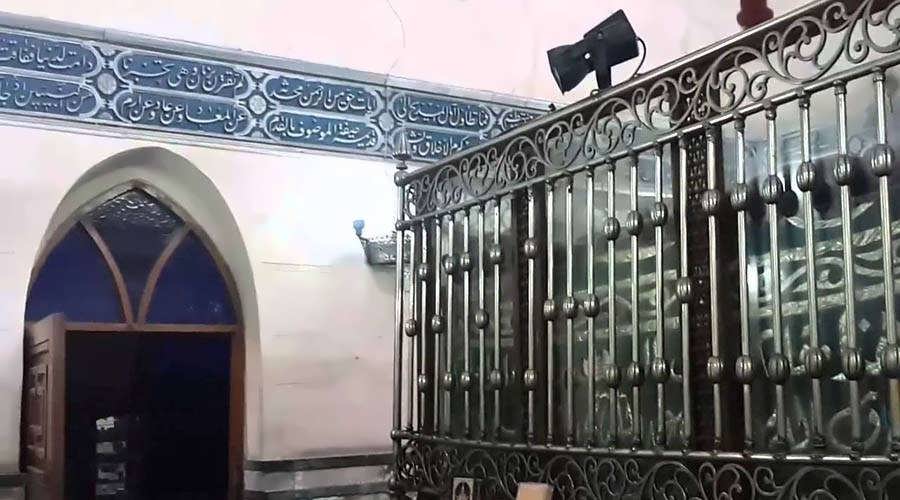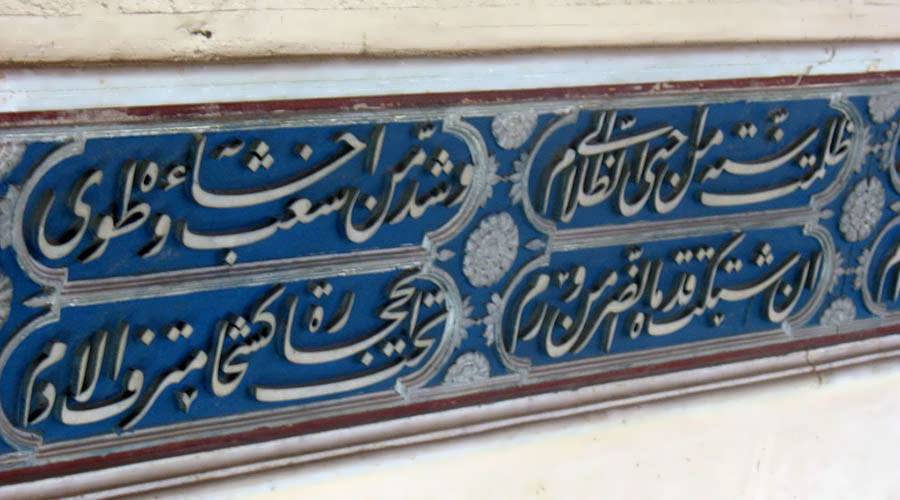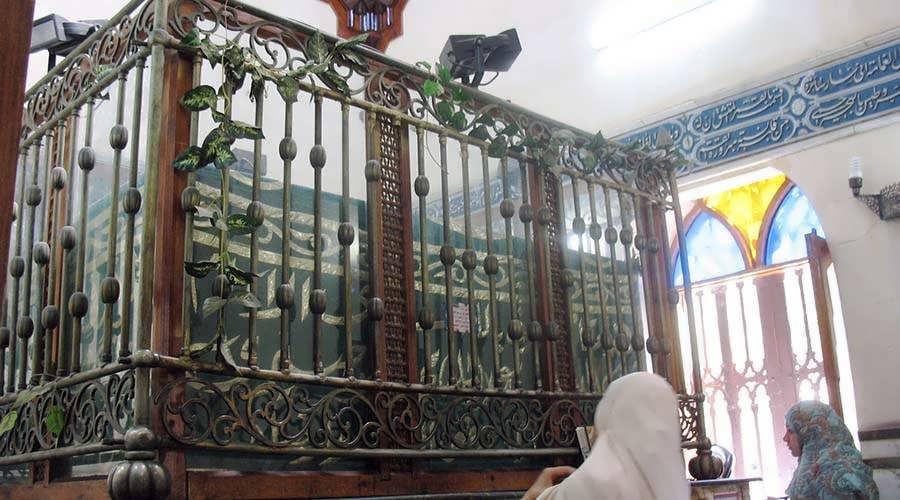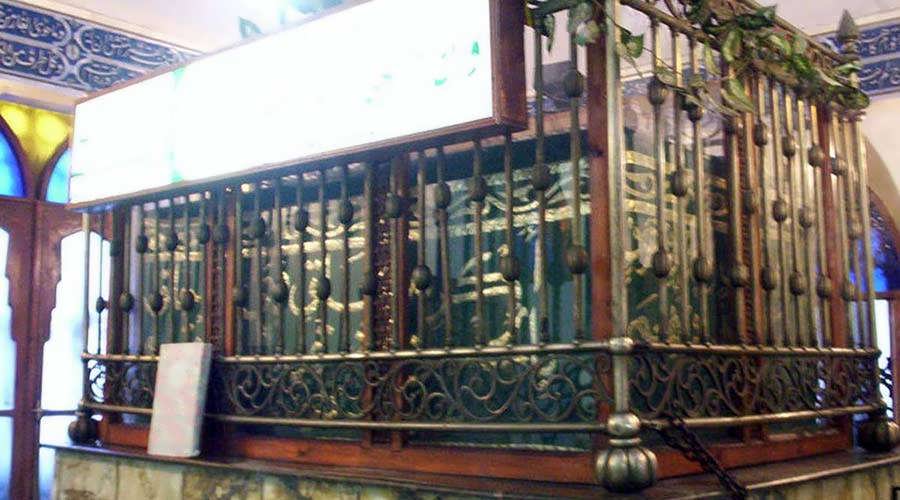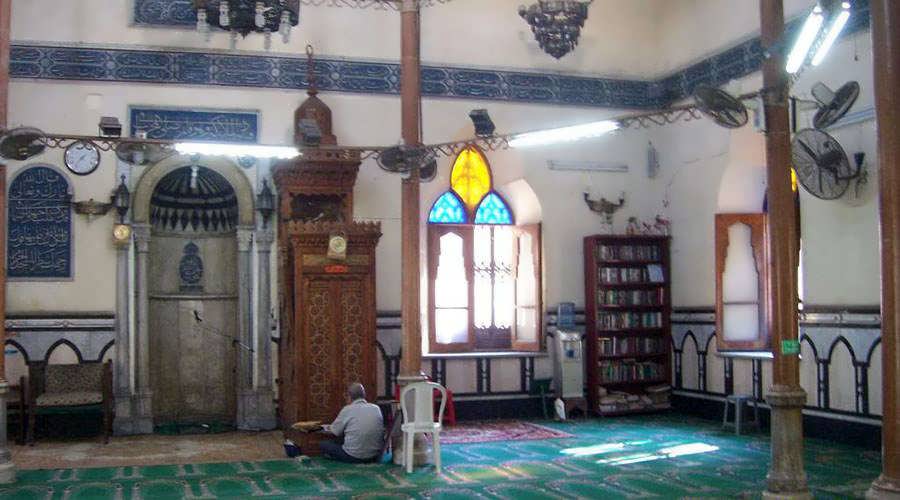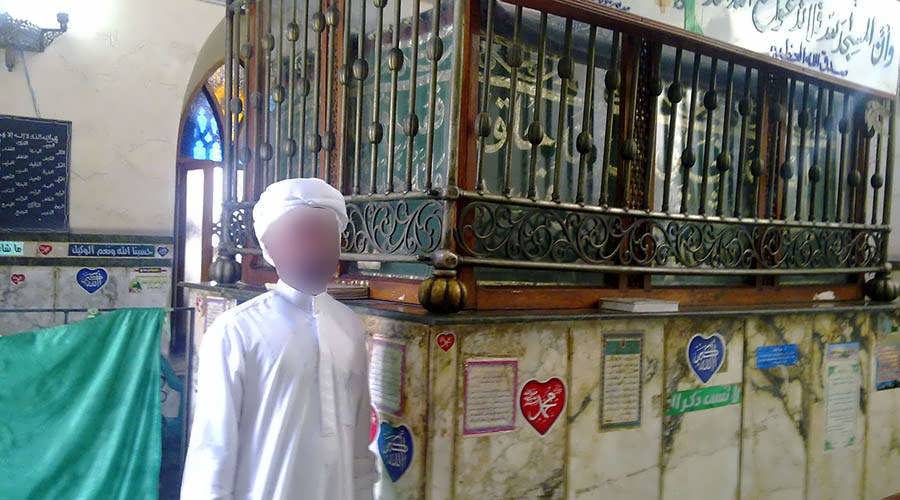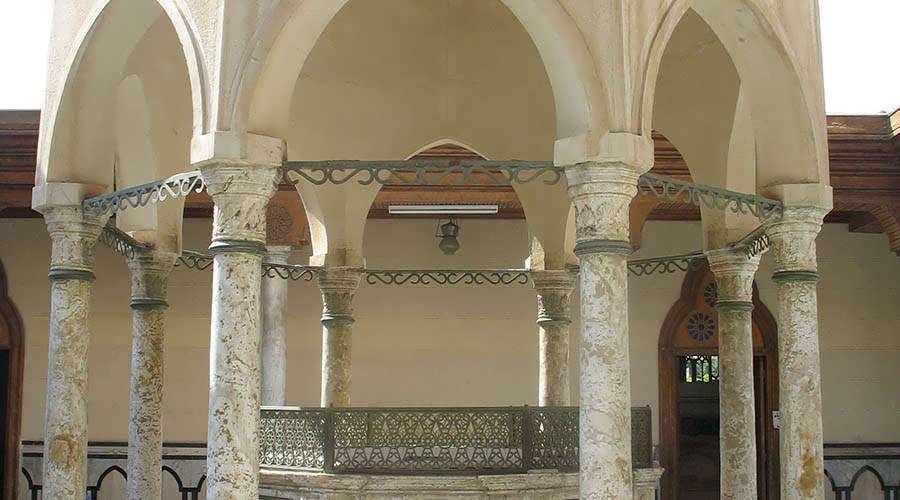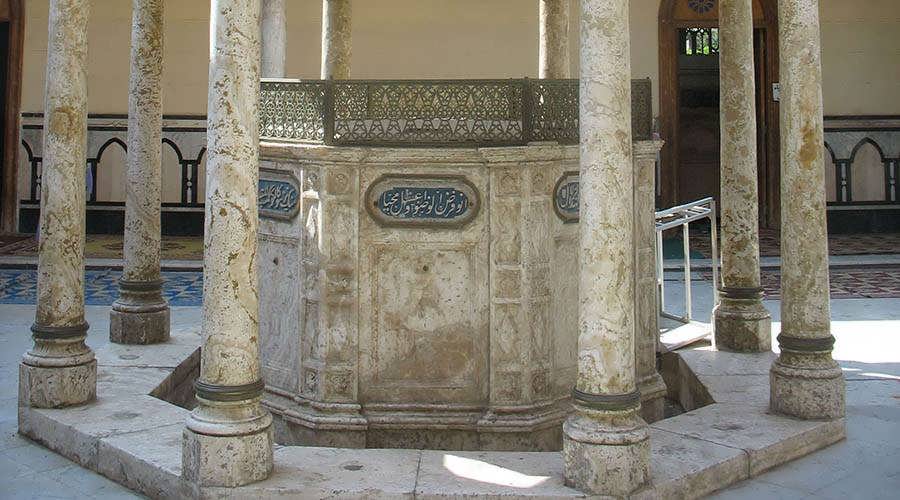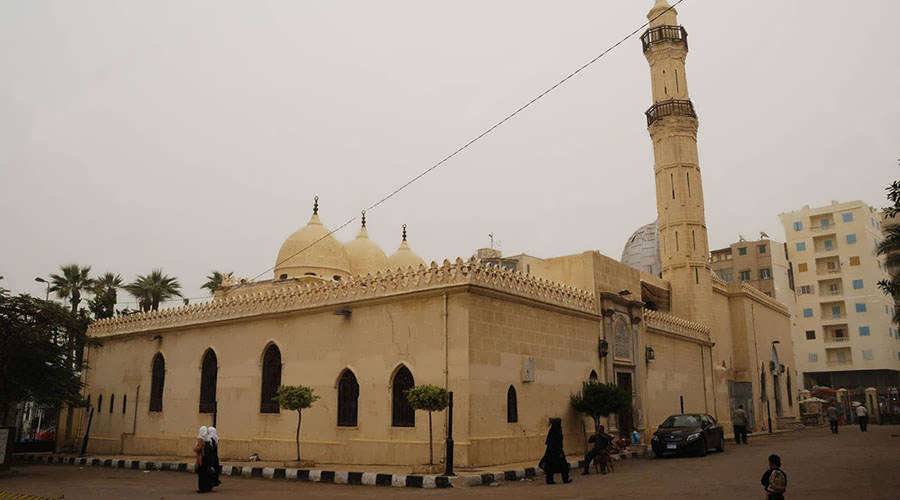Imam Al Busiri Mosque
located in Alexandria city, Egypt. Different biographers present
slightly different versions of Imam Al Busiri’s life. Certain facts
agreed upon by all North African to the Sanhaji tribe of Morocco.
Historian al Maqrizi claimed that Al Busiri’s family was from Hammad
Citadel in Morocco. Furthermore, it was a part of the Banu Habnun tribe.
Little known about Imam Al Busiri childhood. It is although scholars
surmise that he received the usual education for children of his time.
He would have attended a Qur’an school and memorized the entire Qur’an.Kilani
asserts that Imam Al Busiri’s family was poor as he forced to
search for work from a young age. Sometime during his youth, he made his
way to Cairo
where he pursued his studies. There, he exposed to the important
Islamic sciences. They are Arabic language and linguistics. They are
also literature, history and the biography of the Prophet Muammad. Even
as a young man, Imam Al Busiri began to compose poetry which was not of a
religious nature. In 1240 at the age of 30, he composed a poem to
petition the King Najm Al Din Al Ayyubi. It was when he failed to allot a
generous endowment to Imam Al Busiri mosque Alexandria.Further details about Imam Al Busiri mosque Alexandria: An accomplished poet, he would often recite his poetry and give lessons at mosques in Cairo.
Many young poets studied under him. They are such as Athir al-Din
Muammad Ibn Yusuf Abu Hayyan al-Andalusi 1325 AC. And Abu al-Fath Ibn
Sayyid al-Nas al-Yamari 1334 AC and Izz al-Din b. Jamaah 1335 AC. His
best known for the deeply religious are Burdah and the Hamziyyah poems.
Imam Al Busiri’s complete diwan is still extant. It includes poetry that
reveals the transition from a rough and terse youth. It also include a
mature man with a deeply spiritual disposition. Based on his poetry, one
can map out his spiritual development. He records his experiences in
life, interactions with people, complaints, and insights.Imam Al
Busiri’s short and slender stature led the people ridicule him. It led
also to be the source of their jokes. Early on in his career, he wrote a
number satire poems. They revealed his feelings about being ridiculed.
He also had a hard time accepting criticism from other poets. Moreover,
he even wrote a rebuttal of a poet, one Zayn al-Din who had insulted his
work. He known to have a harsh tongue. Furthermore, he took pleasure in
composing hijaa, or satire, poetry to insult his enemies. The historian
al-Shehab Mahmoud wasa contemporary of Imam Al Busiri. He wrote that he
was a misanthrope who would attack others with his words. He also added
that he had a bad reputation in the courts of princes and viziers. More details about Imam Al Busiri mosque Alexandria: Imam Al Busiri lived in various locations in Cairo
and in the Delta region. He worked primarily as a scribe and poet for
the local rulers. At one time, a ruler offered him the position of a
muhtasib, or market inspector, in Cairo
but he rejected it. From this job offer, we can find out that Imam Al
Busiri had a decent knowledge of Islamic law.
It is because the job
requires a thorough knowledge of Islamic jurisprudence and law. He lived
for a long time in the Lower Egypt town of Bilbis 1261-1265 AC.
Moreover, he worked there as a scribe and manuscript copyist. He seems
to skilled in accounting. That was although al-Maqrizi claimed that he
made a lot of mistakes and was not competent in this skill.Imam
Al Busiri interested in religious polemics. He read the Hebrew
Bible, New Testament, and religious history of Judaism. He also read
Christianity primarily. It was defend Islam and the position of the
Prophet Muammad. Some of his colleagues at work were Jewish and
Christian. In fact, he known to engage in fiery debates with them. He
interested in proving to them that the Gospels did not indicate that
Jesus was a god. And that it contained signs of the coming of the
Prophet Muammad. He was also concerned with correcting what he believed
to be mistakes. It was in the Hebrew Bible that told stories of the
prophets and of their sins.Further details about Imam Al Busiri mosque Alexandria: In
addition to being a poet, Imam Al Busiri was also a fine calligrapher.
He was also a composer of prose, although nothing of his writing or
calligraphy is extant. It said at one point, he made a living designing
the engravings for tombstones. In an attempt to make money, he also
opened a Qur’an school for children in Cairo. But this venture failed
and he forced to close it. As for his domestic life, his poems paint a
hellish impression of living. It was with his constantly pregnant wife
and gaggle of children. He talks of his wife conspiring with his
sister-in-law. It was to get him to divorce her by hitting him and
pulling out the hairs from his beard. Moreover, he also complains in
detail about old age. He also does about his inability to provide his
children with enough food and the problem he faced.In fact, he
could not provide his daughter with furnishings for her home for her
marriage. Moreover, he spent some time in the central Delta town of
al-Mahallah. It was where he was the poet and scribe for the mayor. He
received a monthly wage for composing panegyric poems of the ruler. In
al-Mahallah, Imam Al Busiri clashed with the local Christian scribes,
copyists and poets. He wrote verses complaining of his treatment at
their hands. Sometime during his stay in al-Mahallah, it seems he broke
his leg. It was on a visit to the public baths and complained bitterly
about his leg in many poems.More details about Imam Al Busiri mosque Alexandria: His
relation with others was so bad that it reached the point where they
wished he would die. Once, when he became very sick, a rumor quickly
spread that he had died. Upon recovering from his sickness, he wrote a
satirical poem. It was to mock his enemies who spread rumors of his
death. The phrase was “I am not the one who would die before them”. I
will survive them and weep over their graves. It’s true that I had
almost lost my life but the generosity of this vizier gave me a new
lifeImam Al Busiri had enemies among Jews, Christians and
among his coreligionists. In fact, he also had enemies among those
closest to him, including his wife. He wrote satirical poems attacking
anyone who criticized or insulted him. He recorded each event and
rebuttal in a poem. According to al-Maqrizi, Imam Al Busiri would
befriend important members of the court. It was such as the vizier Zayn
al-Din. al-Zubayr. And would support them no matter if they were just or
oppressive rulers. He supported the Mamluk rulers. He wrote zealous
panegyric poems . The poems praised Turkish Mamluks that also affronted
the local Arab population. The only positive characteristic of Imam Al
Busiri recorded by al-Maqrizi.
It was that he was generous.Further details about Imam Al Busiri mosque Alexandria:It not known when exactly Imam Al Busiri became a disciple of Al Mursi Abu Al Abbas. It can posited that this happened later on in his life. Itis at least some years before the death of al-Mursi in 1287 AC. Imam Al Busiri seemed to have struggled to follow Sufi principles. He desired to live in isolation from people. In fact, he had a large family and was often unable to feed them due to his poverty. He said “If I were on my own, I like to be a disciple in a Sufi hostel.His later poetry consists mainly of panegyric poems praising the Prophet Muhammad. And he bears little similarity to that of his earlier satirical poems. Perhaps after becoming a Sufi disciple, he underwent a spiritual awakening. It seen in the form the Burdah and the accompanying story of its composition. Moreover, it also was from his previous harsh and misanthropic nature. It seems to be conflicting information about Imam Al Busiri ’s life. It seen in the biographies of non-Sufi historians. Furthermore, it also seen from hagiographies written by Sufi scholars. Sufi hagiographies always describe him as an older man with a head of white hair.More details about Imam Al Busiri mosque Alexandria: The time line of Imam Al Busiri’s life is not clear. It known that as a grown man, he drawn towards Sufism. He joined the Shadhili order under the guidance of his Shaykh Abu al-Abbas al-Mursi. It was in Alexandria. And which at the time was a center for North African Sufis. At this time, the Shadhili Sufi order was still in its infancy and founded by al-Mursi. Imam Al Busiri was fond of Al Mursi Abu Al Abbas. He studied Sufi thought and practice under him. This background would have a strong influence on his later poetry. He was faithful to his order. He wrote poems full of praise of al-Shadhili and al-Mursi. They were in their spiritual attributes and ranking. Imam Al Busiri was the contemporary of Ibn al-Farid, the great Sufi poet and mystic.It also said that he was a friend of Ibn Ata Allah Al Sakandari. Al Sakandari is Sufi scholar and jurists. He wrote the famous Hikam, or collection of Sufi aphorisms. It is as well as a spiritual biography of A Shadhili and Al Mursi. In Sufi hagiographies, Imam Al Busiri painted as a saint-like figure. It is the person who had reached the high spiritual station (maqam) of Al Ghawthiyyah Al kubra. They claim that when he walks down the street, the young and old come out to greet him. They also kiss his hand. It said that his bod has emitted a sweet scent. He wore fine clothes, had a head of snow-white hair and humble smile. He was ascetic in his lifestyle. Moreover, he also had a respectable and virtuous character.Further details about Imam Al Busiri mosque Alexandria: Kilani disregards these attributes of Imam Al Busiri based on his readings of his poetry. Imam Al Busiri was indeed an unpleasant person. It was for much of his life until he discovered Sufism. He mended his ways, and reached a high spiritual station. This station respected and acknowledged by his fellow Sufis. Imam Al Busiri’s praise poetry of the Prophet Muhammad divided into two periods. The first from before Imam Al Busiri’s Hajj and the second after his return from the Hajj. Imam Al Busiri did not perform his pilgrimage until at least after 1255 AC. Before going on Hajj, he composed many praise poems. Some of them referred to his longing to visit the tomb of the Prophet. Upon his arrival to Madinah and Makkah, he composed poems revealing his joy. The joy is at the tomb of his beloved and other places which Prophet visited. Although buried in Alexandria, it not known if Imam Al Busiri spent his last years in Cairo or Alexandria. His official tomb located in Alexandria, there are some dispute about where he buried. Al-Maqrizi recorded that he died in al-Mansuri Hospital in Cairo. Al- Ayyashi is a North African traveler who visited Cairo in 1663 AC. He mentioned that he visited Imam Al Busiri’s tomb in the area of the jurist Imam al-Shafii’s tomb. It located in the southern cemetery of Cairo. Imam Al Busiri indeed buried at the foot of al-Muqattam hills. It is where historians presumably thought the younger poet Imam Al Busiri buried.


